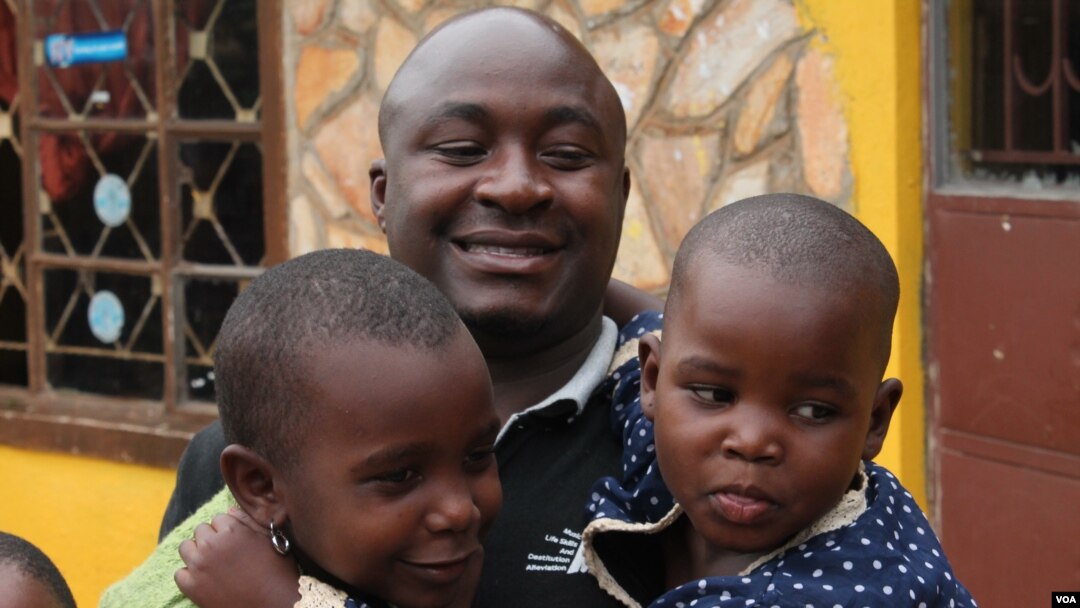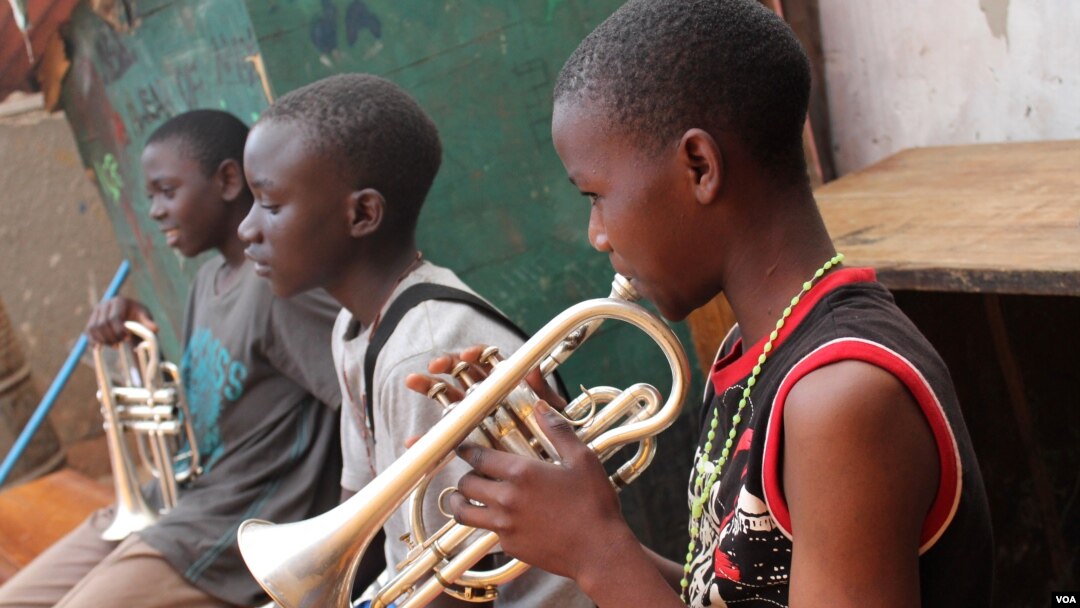KAMPALA —
After hearing a school band practice, a group of street kids in 1990s Uganda set up a brass band of its own called M-lisada. Today the band's original founder runs a home for street kids, teaching them to play instruments and perform in concerts and becoming a source of pride for kids who had lost all hope.
Seventeen-year-old Derick Tamale does not know how old he was when he lost his parents and his home. As far as he can remember he spent his whole childhood on the streets of Kampala, running with a group of other boys, living by stealing and picking food out of the trash.
“It was a miserable life, because I didn’t have a home. When it came to night, [there was] nowhere you could sleep. We only slept on the verandas. Sometimes we got food from the rubbish, and then sometimes we’d go to big hotels like Serena, where they throw things that are not so good to sell to people, like cakes.”
But then one day he discovered music, and his life changed forever.
Derick happened to see a brass band called M-lisada playing in the slums. The group is made up entirely of former street kids, and their concerts help finance the orphanage where they live. Derick joined them and is now an accomplished trombone player, eager to talk about music with everyone he meets.

“In slums people don’t appreciate children, even if children try and try, it’s very hard," Segawa said. "So it was my first experience to see [that] people could appreciate the children because of music. From that time, I thought maybe I could become a musician so that one day people could appreciate me.”
With the help of a music teacher, Segawa and a few friends learned to play on secondhand instruments, eventually scraping together some funding to rent a small house and start a band.
Over the years, he says, music has transformed their lives.
“All of them were not perfect musicians, but they discovered what they could do. One is a lawyer, two are businessmen, one is a mechanic, one is a social worker who works with me, and one is an expert in education," he said. "I’m not a professional musician, but I’m a teacher who teaches young kids.”
For the 80 kids in his orphanage, Segawa hopes that music will help them discover their potential as well.
Godfrey Mboira, a volunteer music teacher, says that on a more basic level, being in a band helps former street kids build confidence and feel like valued members of a team.
“It empowers them and they will do what people don’t expect them to do," said Mboira. "And then at the end of it they feel they are appreciated. At at least every performance they say, ‘well done, well done.’ That’s the most important thing these children have been missing all those years on the streets.”
The children at M-lisada all go to school, but after class every day they practice for upcoming concerts.
For Derick, it is one of the best parts of the day. He says playing the trombone makes him feel important. And if it were not for the band, he says, he does not know what would have become of him.
“I think I would maybe be dead by this time. Because on the street everyday I would see my friends dying, using drugs and then they end up dying. Maybe I would have been in jail, somewhere working as a prisoner, or maybe just a useless person on the street. Music is the one which is making me to be where I am now. It is really a thing which rescued me," said Derick.
But he is one of the lucky ones. The orphanage is small, with no more than three bedrooms. Thousands of children are still living on the streets. Many come during the day to rest and listen to the music.
But when night falls, they melt back into the shadows of the city.
Seventeen-year-old Derick Tamale does not know how old he was when he lost his parents and his home. As far as he can remember he spent his whole childhood on the streets of Kampala, running with a group of other boys, living by stealing and picking food out of the trash.
“It was a miserable life, because I didn’t have a home. When it came to night, [there was] nowhere you could sleep. We only slept on the verandas. Sometimes we got food from the rubbish, and then sometimes we’d go to big hotels like Serena, where they throw things that are not so good to sell to people, like cakes.”
But then one day he discovered music, and his life changed forever.
Derick happened to see a brass band called M-lisada playing in the slums. The group is made up entirely of former street kids, and their concerts help finance the orphanage where they live. Derick joined them and is now an accomplished trombone player, eager to talk about music with everyone he meets.

Bosco Segawa with two of the former street kids at his orphanage in Kampala, Uganda, Oct. 25, 2013. (VOA/Hilary Heuler))
Bosco Segawa, M-lisada’s founder, understands the feeling. He grew up as a street kid himself, but discovered music when he was 12 and chanced upon a school band playing a concert. When he saw all the parents clapping, he says, he was hooked.“In slums people don’t appreciate children, even if children try and try, it’s very hard," Segawa said. "So it was my first experience to see [that] people could appreciate the children because of music. From that time, I thought maybe I could become a musician so that one day people could appreciate me.”
With the help of a music teacher, Segawa and a few friends learned to play on secondhand instruments, eventually scraping together some funding to rent a small house and start a band.
Over the years, he says, music has transformed their lives.
“All of them were not perfect musicians, but they discovered what they could do. One is a lawyer, two are businessmen, one is a mechanic, one is a social worker who works with me, and one is an expert in education," he said. "I’m not a professional musician, but I’m a teacher who teaches young kids.”
For the 80 kids in his orphanage, Segawa hopes that music will help them discover their potential as well.
Godfrey Mboira, a volunteer music teacher, says that on a more basic level, being in a band helps former street kids build confidence and feel like valued members of a team.
“It empowers them and they will do what people don’t expect them to do," said Mboira. "And then at the end of it they feel they are appreciated. At at least every performance they say, ‘well done, well done.’ That’s the most important thing these children have been missing all those years on the streets.”
The children at M-lisada all go to school, but after class every day they practice for upcoming concerts.
For Derick, it is one of the best parts of the day. He says playing the trombone makes him feel important. And if it were not for the band, he says, he does not know what would have become of him.
“I think I would maybe be dead by this time. Because on the street everyday I would see my friends dying, using drugs and then they end up dying. Maybe I would have been in jail, somewhere working as a prisoner, or maybe just a useless person on the street. Music is the one which is making me to be where I am now. It is really a thing which rescued me," said Derick.
But he is one of the lucky ones. The orphanage is small, with no more than three bedrooms. Thousands of children are still living on the streets. Many come during the day to rest and listen to the music.
But when night falls, they melt back into the shadows of the city.


